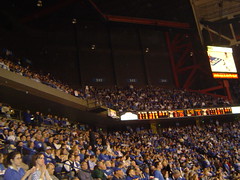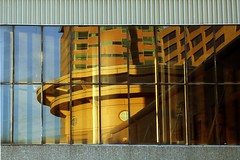 People from all over the country have enjoyed a music or sports event held in the Rupp Arena, a place that Kentucky Wildcats basketball fans consider sacred ground. But Arenas and other large venues have a very tough job, with many to please. They must excel in services for promoters to emerging as a winner in the highly competitive tour-date market, and assist with the tremendous physical challenges that changing an entire arena facility from basketball to tractor pull to wresting match sometimes in just days. Companies like Rupp are at are at the crossroad of fans, artists, record labels, sports promotion, and live concert companies – each with special needs. As the music industry changes towards higher end live shows and advanced merchandising, they will be in an increasingly important position
People from all over the country have enjoyed a music or sports event held in the Rupp Arena, a place that Kentucky Wildcats basketball fans consider sacred ground. But Arenas and other large venues have a very tough job, with many to please. They must excel in services for promoters to emerging as a winner in the highly competitive tour-date market, and assist with the tremendous physical challenges that changing an entire arena facility from basketball to tractor pull to wresting match sometimes in just days. Companies like Rupp are at are at the crossroad of fans, artists, record labels, sports promotion, and live concert companies – each with special needs. As the music industry changes towards higher end live shows and advanced merchandising, they will be in an increasingly important position
While record companies will probably transform themselves in the next few years, bands like Radiohead and Nine Inch Nails led the industry by releasing recent albums directly to fans, while performing lucrative concerts and striking high-priced merchandising deals. In fact, as I write this, both of these bands are rumored to be headlining the gigantic Lollapalooza concert in 2008, where some tickets are expected to cost as much as $300 each and sell out in a few minutes. Just this week, I read where REM is releasing its latest album on the social site iLike.
Arenas Tap Fan Energy
By understanding and conversing with fans, venues can begin to take advantage of the tribal otaku of music and sports. Starting with a blog and Twitter presence, Rupp has embraced authentic, participatory media as a way to get closer to sports and music fans. But challenges, some unique to this business, particularly adhering to the protocols of promotion, licensing, and tour managers. Another logistical challenge is posting in a timely manner, especially while so busy and with events that often run late into the night. People will expect activity ahead of, during, and after events happen, as social media has no patience. I’m hoping they build up a list of guest bloggers to keep the energy alive. If they have flexibility to do so, there are an infinite number of ways that artists can use social media too.
For most businesses, confusion abounds in social networking, but the team at Rupp seems to have hit the ground running, embracing the conversational nature rather than just making another way to pitch their wares. My friend and Social Media consultant Jason Falls noticed this about their efforts as well.  Arenas may use Twitter / Blogs to answer questions, send out announcements, and run contests interactively, and since Twitter a mobile-friendly system, live event activities such as pre-event parties and more may take root as long as they don’t turn it into spam.
Arenas may use Twitter / Blogs to answer questions, send out announcements, and run contests interactively, and since Twitter a mobile-friendly system, live event activities such as pre-event parties and more may take root as long as they don’t turn it into spam.
People close to the industry had some excellent commentary
Dave Brooks, writer with Venues Today, told me “Everyone is moving towards the various social media platforms, but I think it will take a while for them to hit their potential. Many venues are still reacting, exploring platforms and so on. We’ll have to wait and see the real impact.”
Connie Chesner, Wake Forest University Communications Instructor and Marketing Researcher with OTM Partners pointed out: “For ongoing relationships such as fans or sports enthusiasts, it provides an opportunity to build online/off-line relationships in a larger social context. The cohesive nature of event attendance provides fertile ground upon which to build socially dynamic experiences for visitors….. For ongoing relationships (university sports teams), it provides a massive opportunity to build an online/off-line relationship for a fan base where attendance at events becomes a larger social context than previously. Now, a ticket holder is not just going to the game with their friends they are driving with, they are meeting up with the group they’ve been interacting with online for days or weeks.”
Some Ideas for Arenas and Live Venues
Jack Powers, of IN3.org gave this excellent list of ways Social Media can be used in this industry:
- Post repositories of professionally created photos,video clips, text files, logos and sound clips that authors can use in their work
- Provide some “blogger-only” content
- Set up chats with performers, give links to relevant sites.
- Distribute widgets that provide always-fresh branded content about the artist, venue and event.
- Create a Twitter channel for pre-event updates, and an on-site channel for minute-by-minute tweets.
- Make a billboard page where users can post their own links to their blogs, Meet-Up groups. Flickr steams, YouTube channels, Facebook Groups and all the other user-generated gathering points.
- Organize the masses editorially with recommended keywords, folksonomy tags, content guidelines, parental ratings that professionalize the fan content.
- Distribute digital content that only ticket holders at the event can get: Bluetooth-ed music videos, phone cam photos of the performers with the audience, live shots of unique concert happenings — sort of an electronic autograph for the folks who showed up.
- Promote user links with contests and prizes; sell sponsorships in the user content and share the wealth
- Negotiate all this content freedom with the agents, lawyers, record labels and stars.
Seth Godin further examines the tribal nature of these events
The next thing is this idea that people care very much about who is sitting next to them at the concert. They care very much about the secret handshake. They care very much about the tribal identification. “Oh you like them, I like them”. The Grateful Dead is an amazingly successful paradigm for many of the things I’m talking about. They didn’t make any money selling records compared to the way they made money doing everything else. Part of it was, you knew if you met someone at a dead concert, they had some things in common with you. The secret handshake, the clothes, whatever it was. And that was important and you were willing to pay money to be with those people. And after Jerry died it was very interesting. Because obviously there was thousands of hours to listen to but that’s not what the people missed. The people missed the place they could go to meet the people like them. At Facebook, it’s all about that. 64 million people who go there every day so they can meet people like them because [Facebook] is very good at dividing people up. ….And the last one is back to this tribal thing. It’s really important to people to feel like they are part of that tribe, to feel that adrenaline. We are willing to pay money, we’re willing to go through huge hoops, trampled to death in Cincinnati if necessary, in order to be in the environment where we feel that’s going on.
What do you think???
arena photo credit: Sonnett (CC)
reflections photo credit: code poet (CC)








Hey Scott!
I’ve never seen an industry that couldn’t use SMM to succeed with a different (younger usually) demographic. As such, a concert hall and opera house would do well to show off their talents and artists that appeal to that crowd.
I would suggest a broadcast streamed live over the internet to the venue’s website. If you featured a big name artist, you would increase the brand of the venue and promoting agency as well as give new viewers something different than they’re used to.
With proper promotion (reveal the performing artists 2 days before), you would have the entertainment blogosphere on fire with predictions and talk of who it is, and where it’s happening.
Great write-up Scott. And thanks for the link. Rupp is doing good things and can serve as a great case study in social media leadership.
Brandon Hopkins’ idea of teasing the performance over the web is a good example of building buzz ahead of the event. Seth Godin’s point about the strength of the audience experience — nowadays media types call it “engagement” — unveils the untapped value of a live event. The concert isn’t over after the curtain comes down: it lives on in the hearts and minds of the people who were there in the moment.
(In a similar way, air travel meet-ups like Peter Shankman’s TripLife.com do this for fequent flyers.)
If you can capture that moment digitally — get the email addresses, blog links, SMS and MMS addresses, tags and keywords — you can re-visit the magic and maybe even sell those folks something else in the future. Just don’t be a pig about it.
thanks for the mention — great article !